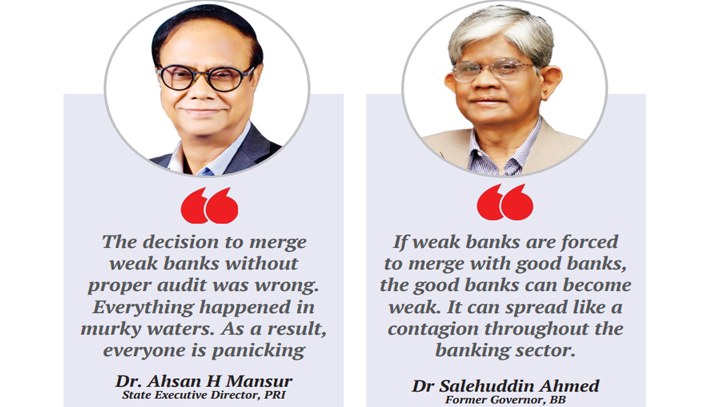
Photo : Messenger
There is already uncertainty about whether the initiative taken by Bangladesh Bank to merge financially weakened and troubled banks with relatively strong banks will ultimately succeed or not. Some banks have already objected to this move.
Although Bangladesh Bank (BB) has issued a policy on mergers, it has been alleged that the central bank itself is not following it. According to the policy, the banks can discuss among themselves and decide on the merger. However, complaints are being made by several weaker banks that BB is forcefully imposing this decision on them.
Experts have said there is a danger of the opposite result if the decision of merger is imposed forcefully without proper trial and analysis. In that case, even good banks may face losses. It is known that the banks which are going to be merged with other banks have suddenly been under pressure to withdraw deposits. Work enthusiasm has also decreased among the officers and employees. Many are panicking and trying to change jobs.
If this continues, the top-level officials of the weaker banks have expressed fear that their financial base will become weaker and weaker. Several weaker bank officials, who did not wish to be named, said that after the information about the merger came to the media, large depositors of the banks have written letters expressing their intention to withdraw their money. This has deepened the liquidity crisis.
The matter has already been informed to the central bank. As a result, due to the pressure from depositors on one side and influential bank entrepreneurs on the other, BB is moving away from its initial position. The central bank has already announced that no more weak banks will be merged with strong banks. A new decision will be taken based on the results of those mergers that have already been decided.
Dr. Ahsan H Mansur, executive director of the Policy Research Institute (PRI), told The Daily Messenger, "The decision to merge weak banks without proper audit was wrong. Everything happened in murky waters. As a result, everyone is panicking. Some have taken advantage of this situation, and investors will also suffer losses. Now it will be good for the country if the process of merging these five banks is completed through the proper process."
Meanwhile, allegations have been raised that the policies announced by Bangladesh Bank and what is being done in practice - these two things are contradictory. Because, BB said if a bank wants to merge voluntarily, its board of directors will decide. And for this, the banks have been allowed time until March 2025. That is, after March 2025, BB will be able to compulsorily merge weaker banks.
However, according to the information obtained from the 10 banks that are already being discussed for merger, except for two banks, the other eight banks have not reached any decision among themselves. That is, a lot has been imposed by BB, said the top-level officials of these banks. And for this reason, the government-owned Basic Bank has decided in their board of directors' meeting that they will not go for a merger with the private City Bank for the time being.
In this regard, the Acting Managing Director (MD) of Basic Bank, Abu Mohammad Mofazzal, said that Basic Bank is a 100 percent government-owned bank. Depositors kept deposits in Basic Bank as it is a government bank.
Now, according to media reports, Basic Bank is merging with the private City Bank. This means that Basic Bank is becoming a private bank. And because of this, many depositors want to withdraw their deposits from the bank. If this happens, the bank will face more crisis. Since the government is the owner of Basic Bank, it was decided in the board meeting that the government should provide guidance on the way forward. It has already been informed at the highest levels of the government. Now the government will make the decision, he added.
Bangladesh Bank's Executive Director and Spokesperson Mezbaul Haque said, “We have received five public-private proposals for bank mergers. For now, we will not accept any new proposals beyond these proposals. After merging these banks, we will go for new mergers if necessary. Bangladesh Bank will not pursue any new bank mergers until these processes are completed.”
In this regard, Dr. Salehuddin Ahmed, former governor of Bangladesh Bank, told The Daily Messenger, “It is not possible to improve the banking sector by just merging banks. A strong stance should be taken against the directors and officers involved in defaults, corruption, and irregularities. If weak banks are forced to merge with good banks, the good banks can become weak. It can spread like a contagion throughout the banking sector. In order to integrate banks, it should be done according to international norms and best practices.”
Messenger/Fameema








